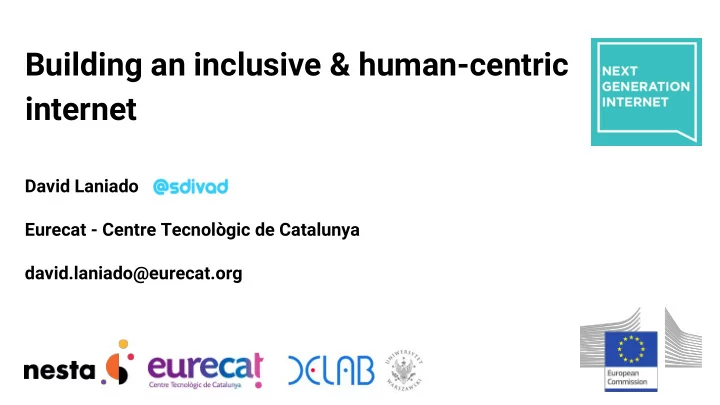

Building an inclusive & human-centric internet David Laniado Eurecat - Centre Tecnològic de Catalunya david.laniado@eurecat.org
The internet today isn’t where we want it to be. But as we find ourselves stuck between two competing narratives (the US and Chinese models) it feels like there is little we, as Europeans, can do to change it.
...But we don’t think that’s true. Europe has an opportunity to take charge in radically rethinking the internet, and the NGI can help us do that.
We developed a data-driven method to identify the most important emerging research topics and technologies for the future internet
Data method
Based on this analysis, we identified 9 core clusters: 1) A Sustainable Internet 2) Decentralising Power 3) Internet and Data Sovereignty 4) Ethical AI and ML 5) A Safe, Accessible and Diverse Internet 6) Trustworthy Online Media and Information Ecosystems 7) Online Identities and Trust 8) The Right to Opt out and Self-Govern 9) Cyber-security and Resilience
1) A Sustainable Internet 2) Decentralising Power 3) Internet and Data Sovereignty 4) Ethical AI and ML 5) A Safe, Accessible and Diverse Internet 6) Trustworthy Online Media and Information Ecosystems 7) Online Identities and Trust 8) The Right to Opt out and Self-Govern 9) Cyber-security and Resilience
A Sustainable Internet ● Energy consumption of the internet’s core infrastructure Energy consumption of ● emerging tech (e.g. Blockchain) Environmental impact of new ● wave of smart devices. ● Resource scarcity & uncertainty about future supplies.
Decentralising power ● Sustainable business models that don’t lead to monopolies. Net neutrality and creating a level ● playing field. Democratising internet governance ● ● Competition policy and antitrust regulation
Internet and data sovereignty ● Lack of control over personal data Decentralised data governance ● and data commons European-made tools & tech ● ● New standards: data portability and interoperability
Ethical AI & ML Embed European values into AI ● development processes ● Transparency and algorithmic accountability ● New standards: high quality and representative data for training algorithms ● Resilient and safe AI tools, e.g. prevent gaming of system.
A safe, accessible & diverse internet ● Access for all and accessibility-by-design ● A safe internet for children and other vulnerable communities Involving diverse voices in ● technology development ● Tools that promote civil discourse and debate online.
Trustworthy online media and information ecosystems Pluralistic, sustainable media ● ecosystems ● Ameliorating the weaponisation of information in a “human-centric” way ● Alternative (community-owned) social media networks and platforms ● Maintaining a representative online collective memory
Online Identities & Trust Secure online identity ● verification & management systems Move from “trustless” to ● trust-enhancing solutions ● Alternatives to “codifying” trust through reputation systems ● E-Estonia+: a secure, European online identity for all 500m
The right to opt out & self-govern ● New models for informed consent (particularly IoT-systems, etc) The right to opt-out but not be ● excluded from wider society The right to tinker, e.g. IoT ● ● New models for online ownership- for individuals and communities.
Cyber-security and resilience Resilient and secure internet ● infrastructures & protocols ● Resilience against cyber-physical attacks ● Future-proof encryption Tools to prevent cyber-crime ●
Thank you!
Recommend
More recommend